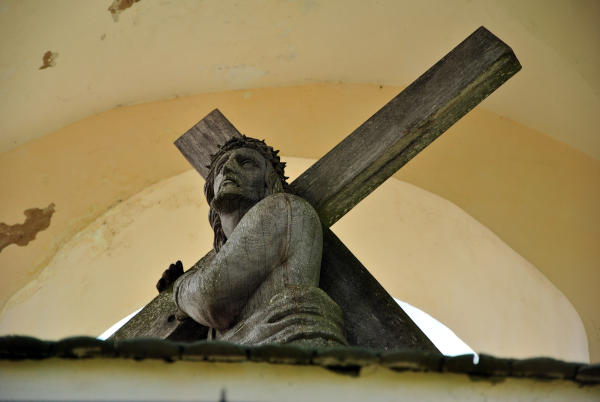A Pepper Grinder Post
Outside the Camp
When I was a kid, I very much wanted to be cool. I knew that I was not like the cool kids. Looking back as an adult, I realize that many of the cool kids were not really what they seemed, but at the time I knew that they were effortlessly cool and that I was different. I learned to present a phlegmatic exterior that masked the intensity I felt inside. I learned that laughing when I was teased was much more effective than getting upset. This didn't make me one of the "in" kids, but it mostly kept me from being in the dreaded group that no one wanted to be friends with.
As I got a little older, I discovered a group of other quirky kids who were wannabe hippies. Here, I could sort of be myself and be an "in" kid, even if the group where I was "in" was a fairly "out" group.
I recently saw the movie Richard Jewell, starring Paul Walter Hauser as Richard Jewell, and directed by Clint Eastwood. The movie is a true story about the security guard who discovered a bomb at the 1996 summer Olympic games in Atlanta, Georgia. Although initially heralded as a hero for discovering the bomb and greatly diminishing the death toll from it, Jewell becomes the FBI's prime suspect in the case when they decide he fits the profile of someone who wants to be seen as a hero by saving people from a disaster which he has created. The movie does a fantastic job of showing the destruction that was wreaked on the lives of Jewell and his mother when a newspaper obtains the information that Jewell is the prime suspect and publishes it.
 I also thought the movie did an excellent job of showing someone who is a decent person, but who is absolutely NOT cool. Jewell is overweight. He was a sheriff's deputy, but was released from that position, and he moved in with his mother after being fired as a college security guard for acting beyond his jurisdiction. Watching the disrespect with which Jewell is treated in the movie is painful.
I also thought the movie did an excellent job of showing someone who is a decent person, but who is absolutely NOT cool. Jewell is overweight. He was a sheriff's deputy, but was released from that position, and he moved in with his mother after being fired as a college security guard for acting beyond his jurisdiction. Watching the disrespect with which Jewell is treated in the movie is painful.
It's in this context that I want to look at Hebrews 13:10-14. Here's my translation of the passage:
We have an altar from which those who serve at the tabernacle have no right to eat. For the high priest brings the blood of animals into the Holy Place to atone for sins, but the bodies are burned outside the camp. So also Jesus suffered outside the city to make the people holy through his own blood. For this reason, let us go out of the camp to him, bearing his shame. For we do not have a lasting city here, but we seek one that is coming later.
Some of the parts of some offerings made on the altar under Old Testament law could be consumed by the people who brought them, after they were offered. There were some parts of the offerings that could only be eaten by the priests, while other parts, such as the fat or the blood, could not be eaten by anyone, but must be burned up or poured out as an offering solely to God. Here, the author of Hebrews is saying that, through Christ, we have something so special that it gives us privileges that surpass those of the high priest. He also appears to be referring specifically to the offering for unintentional sin. The rules for this type of offering are laid out in Leviticus 4. In this offering, the animal was slaughtered before the altar. Its blood was poured out at the base of the altar, and its fat was burned up on the altar. Then the rest of the animal was taken to the place outside the camp, where the ashes from the offerings were dumped, and it was burned completely. The idea was that the guilt of the sinner had been transferred to the animal, and so, the animal must be taken outside the camp and destroyed completely.
The author of Hebrews has done something amazing here. On the one hand, he has said that, through Christ, we have privileges that surpass those of the high priest. On the other hand, he has compared Christ to the animal slaughtered as a sin offering, which must be burned up outside the camp. Christ has suffered the ultimate disgrace so that we might receive the ultimate gift. This is an amazing thing, and I don't want to diminish this message in any way. However, I think some Christians effectively stop reading the passage there. Christ suffered so we could be free--hallelujah!
But the passage doesn't end there. It goes on to say what our response to Christ's appalling sacrifice should be: For this reason, let us go out of the camp to him, bearing his shame.
 Is this shame something mild? No. It has a range of meaning from insults to being reviled. It never refers to anything like gently poking fun at someone. Think of Christ, stark naked, lifted up off the ground on a hilltop, struggling to breathe. Everyone knew he would die; the only question was when. He was in a position of utter powerlessness and defeat. We probably will not suffer that degree of humiliation, but we cannot imagine that we can become partners with Jesus in this world and be universally admired.
Is this shame something mild? No. It has a range of meaning from insults to being reviled. It never refers to anything like gently poking fun at someone. Think of Christ, stark naked, lifted up off the ground on a hilltop, struggling to breathe. Everyone knew he would die; the only question was when. He was in a position of utter powerlessness and defeat. We probably will not suffer that degree of humiliation, but we cannot imagine that we can become partners with Jesus in this world and be universally admired.
But wait a minute. What about when Paul says that someone who wants to be a church leader (overseer in the NIV; bishop in the KJV) must have a good reputation with outsiders so that he won't fall into disgrace? In fact, the word used for "disgrace" in this verse (1 Timothy 3:7) is the same one I've translated as "shame" in Hebrews 13:13. The answer to this apparent contradiction is that we are talking about two different types of disgrace. In 1 Timothy, Paul is concerned that church leaders not be people who would be marred by scandal. He doesn't want leaders who might get in trouble for things like shady business dealings or sexual improprieties. Sadly, we don't have to think long to come up with modern examples of the wisdom of this requirement. Hebrews, on the other hand, is speaking of the kind of disgrace suffered by Jesus, who had done nothing wrong. Even this type of disgrace is not something we should seek out, but we should be ready for it. No Christian should be surprised at being looked down upon by people who don't believe, and often by some who claim the name of Christian.
It is a natural human desire to be part of the "in" group. But Christ has called us to be "out," and to be prepared for disgrace. We must choose whether it is more important to be cool or to belong to Jesus. There have been times and places when it may have been possible, at least temporarily, to be both, but I believe that such a time is at an end in the US. We must decide whether we want temporary adulation now, or eternal joy and honor in the future. It is our choice: "in" or "out?"
- Pepper
Posted 2020-10-31
*Image Credits: Richard Jewell from Variety, Christ carrying cross by asta kr
